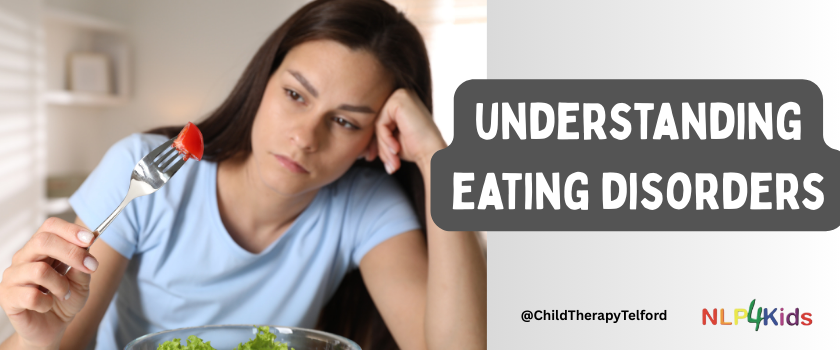Understanding Eating Disorders in Children: Insights and Strategies

This article provides a broad overview of eating disorders and their complexities. It highlights various influences, such as media representation and family history, that can lead to eating disorders. Recovery is possible with the right support and interventions.
The multifaceted nature of eating disorders can be overwhelming, as not all young people will fit neatly into the defined categories of eating disorders. Eating disorders are significant mental health concerns affecting children and adolescents, characterised by unhealthy attitudes towards food and body image. These disorders, such as anorexia, bulimia, and binge eating, can severely impact a young person’s physical and emotional well-being.
Types of Eating Disorders
Anorexia: This involves restricting food intake to maintain a low body weight, often coupled with excessive exercise.
Bulimia: Individuals may engage in binge eating followed by purging through vomiting or laxatives.
Binge Eating: Marked by recurrent episodes of consuming large quantities of food without compensatory behaviours.
Some young people may experience symptoms that do not fit neatly into these categories, known as Eating Disorder Not Otherwise Specified (EDNOS).
Contributing Factors:
Media Influence
The portrayal of idealised body types in the media can create unrealistic expectations, contributing to low self-esteem and a desire to attain a ‘perfect’ body image.
Family Dynamics
A family history of eating disorders, depression, or substance misuse can significantly influence a child’s relationship with food. Observing a loved one struggle with these issues may instill fear or mimicry in younger family members.
Bullying and Criticism
Experiences of bullying based on body size or shape can lead to body dissatisfaction. Children engaged in activities that emphasise physical appearance, such as dance or gymnastics, may be particularly vulnerable.
Control and Perfectionism
For some young people, especially those experiencing high academic pressure, controlling their food intake can provide a sense of agency in an otherwise chaotic environment. Perfectionists may find themselves trapped in a cycle of unrealistic expectations.
Self-Esteem Issues
Events such as trauma or significant life changes can trigger or exacerbate self-esteem issues, making children more susceptible to developing eating disorders.
Treatment and NLP Strategies
Eating disorders are treatable; early intervention is crucial for recovery. Treatment often involves a combination of dietary education, psychological therapy, and, in some cases, medication.
Neuro-Linguistic Programming (NLP) strategies can be particularly effective in addressing the underlying psychological issues associated with eating disorders. Here are some techniques that can be employed:
Reframing: Helping children shift their perspective on food and body image to cultivate a more positive self-view.
Anchoring: Creating positive emotional states that can be accessed during moments of anxiety or self-doubt related to eating.
Visualisation: Guiding children to visualise achieving their goals related to healthy eating and body image, fostering motivation and self-confidence.
In my practice at Child Therapy Telford, I utilise these strategies to support children, teens, and young people in overcoming anxiety and developing healthier relationships with food.
Eating disorders are complex conditions and often coexist with other mental health issues, such as anxiety, depression, or substance abuse. It requires a nuanced understanding and a multi-faceted approach to treatment. By addressing the psychological underpinnings and utilising strategies such as CBT, Psychodynamic, DBT, or NLP, children can work towards recovery and improved self-esteem.
If you would like to learn more about how I help children, teens, and young people understand their thoughts, behaviours, and emotions, please book a 15-minute discovery call here >>> https://louisa-nlp4kids.youcanbook.me/


https://childtherapytelford.nlp4kids.org
The original version of this article was written by Gemma Bailey, director of www.NLP4Kids.org. It was republished and rebuilt with additional content by Louisa Gauld-Crichton – Child Therapy Telford. https://childtherapytelford.nlp4kids.org
Leave a comment
This site uses Akismet to reduce spam. Learn how your comment data is processed.











Leave a Reply